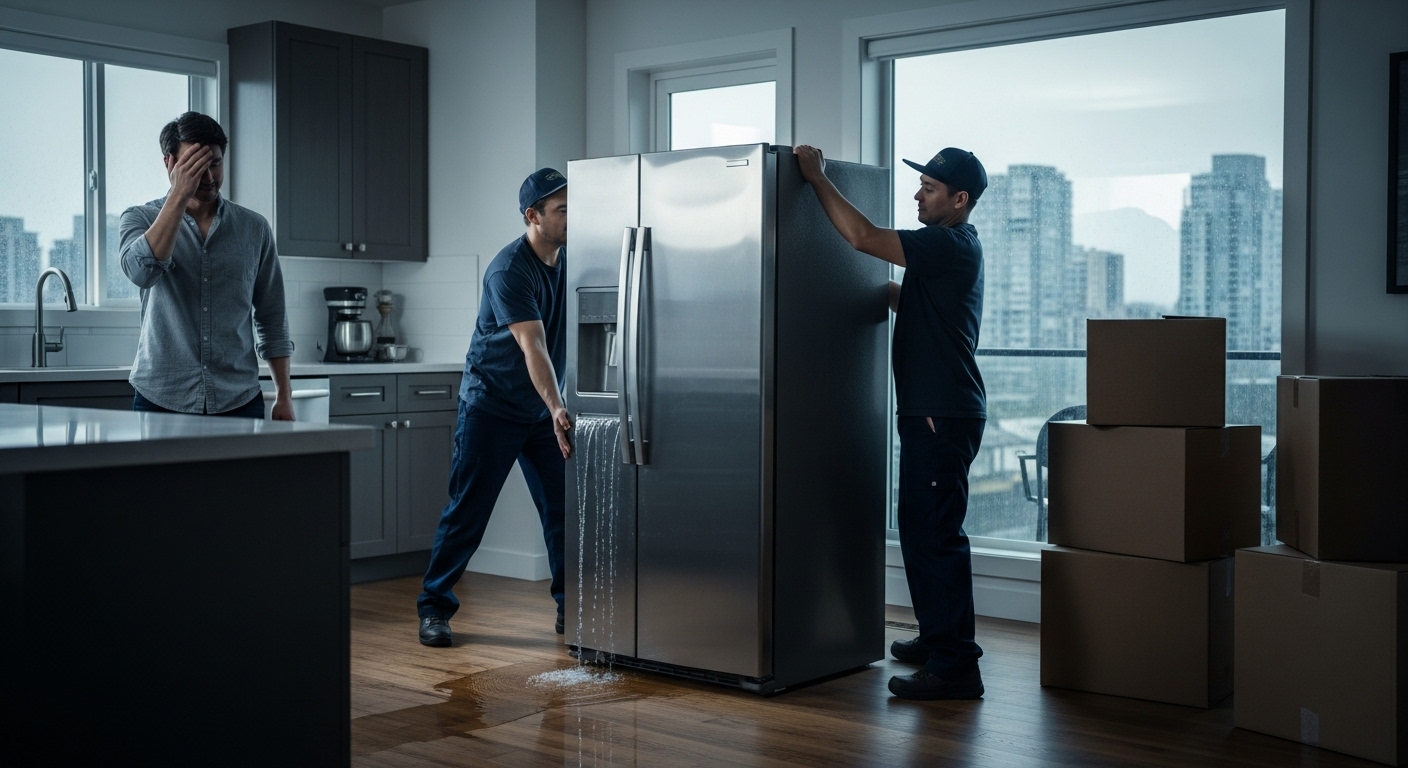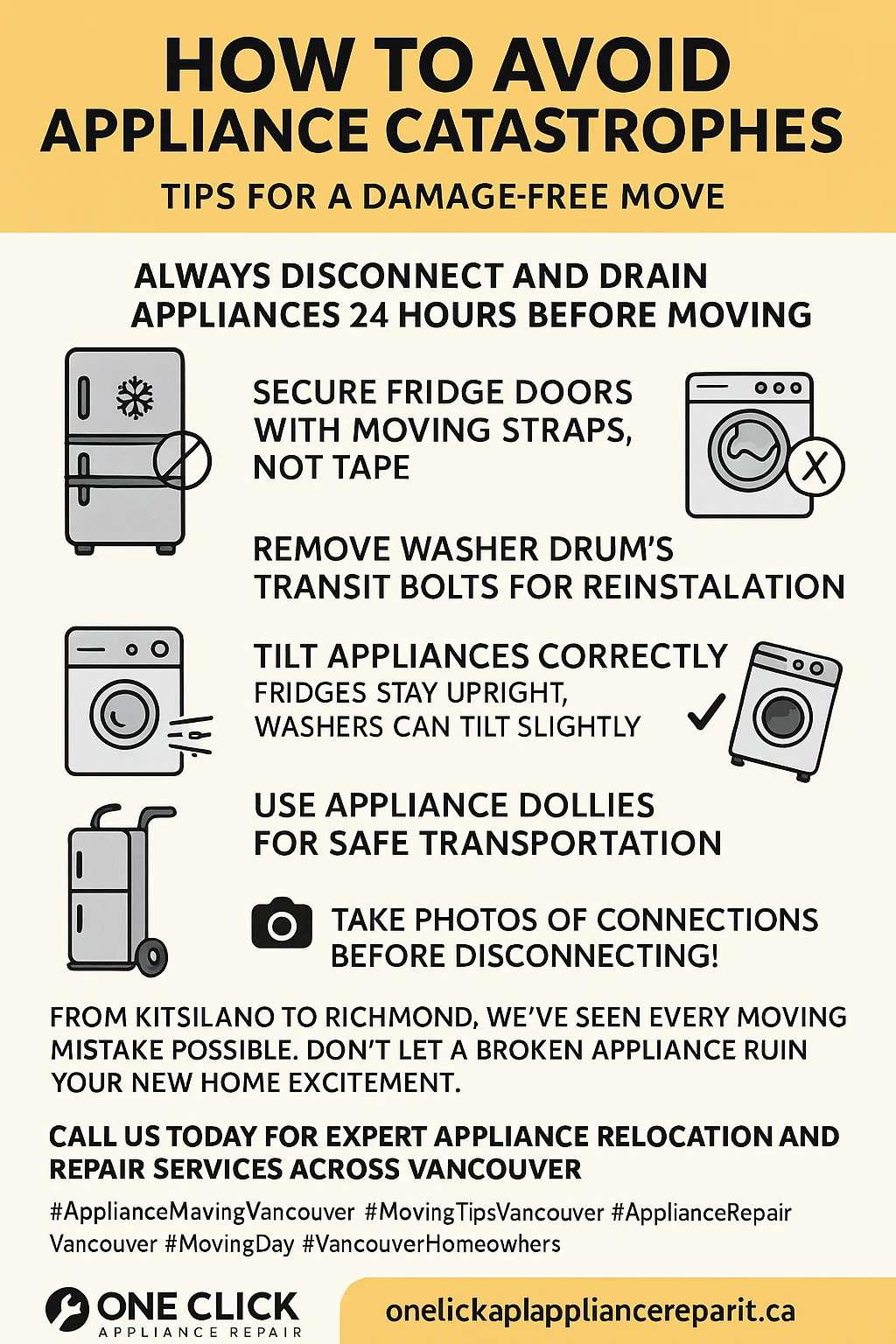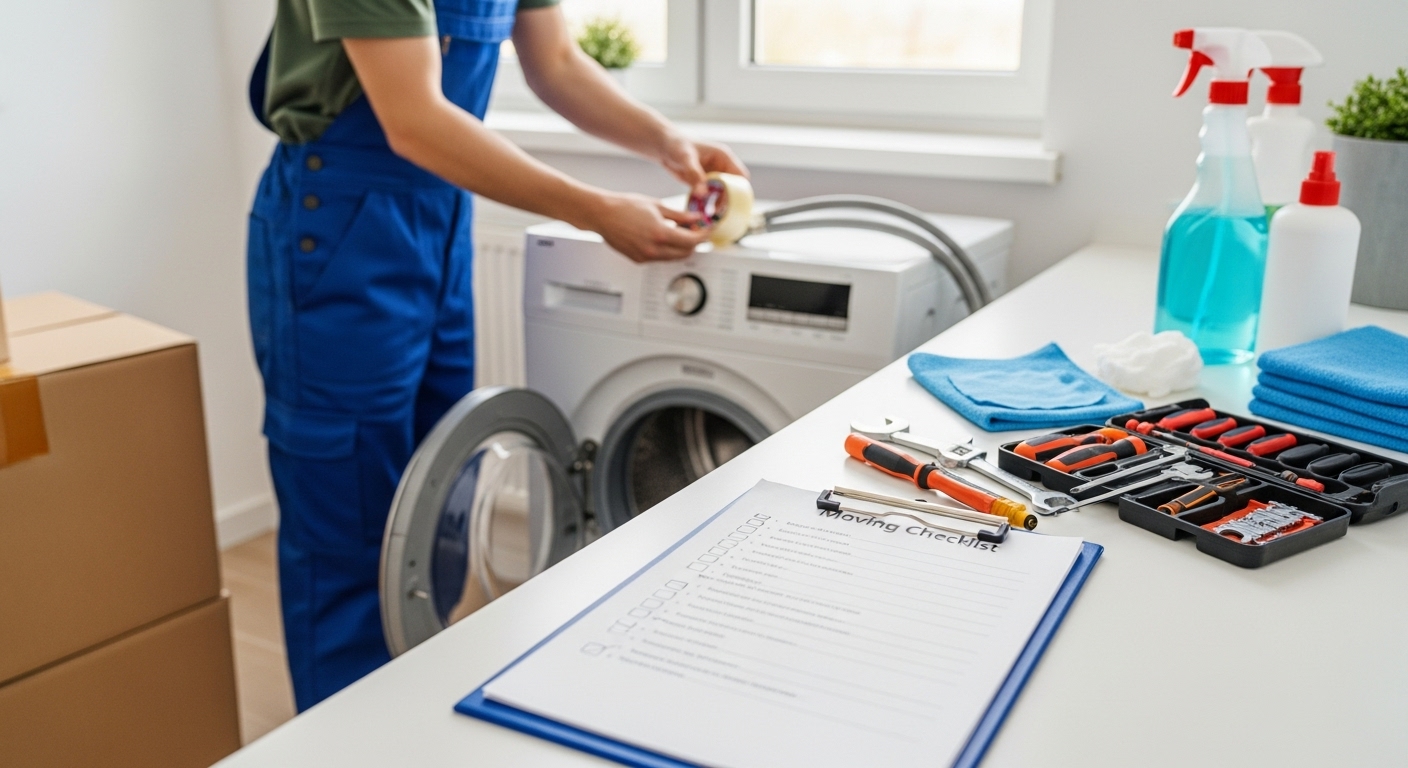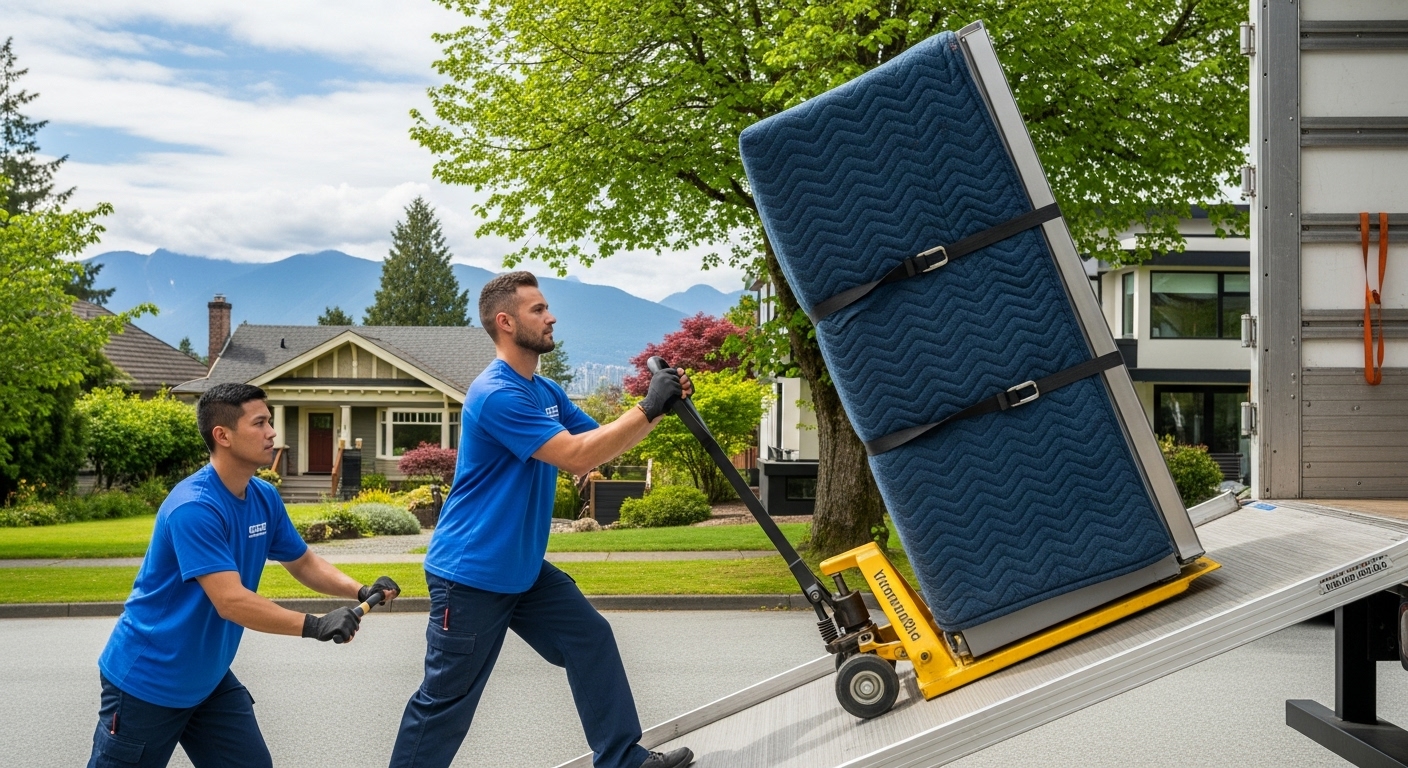Moving Day Appliance Disasters: How to Safely Relocate Your Kitchen Without Breaking Everything (Vancouver Homeowner’s Guide)
Worried about your precious appliances surviving the chaos of moving day in Vancouver’s challenging housing market? We’ve got you covered with proven strategies to protect your refrigerator, washer, dryer, and other essential kitchen appliances during your relocation without breaking the bank on costly repairs or replacements.
Picture this: you’re standing in your empty Vancouver kitchen, watching movers cart away your beloved stainless steel refrigerator that’s been faithfully keeping your midnight snacks cold for the past five years. Your stomach drops as you realize you forgot to properly prepare it for the move, and now there’s a suspicious puddle of water trailing behind it. Sound familiar? Whether you’re relocating within Vancouver or moving to this beautiful Metro Vancouver city, protecting your appliances during a move is absolutely crucial for avoiding costly repairs and replacements. From that trusty washer that’s seen you through countless laundry cycles to the dishwasher that’s been your dinner party hero, these household essentials deserve the same care and attention as your most treasured possessions.

Moving appliances isn’t just about lifting heavy things and hoping for the best, especially in Vancouver’s unique housing landscape of narrow condos, heritage buildings, and unpredictable weather. It’s a delicate dance of preparation, timing, and technique that can mean the difference between a smooth transition and a moving day nightmare that costs you thousands in replacement appliances. The good news is that with proper planning and the right approach, you can ensure your appliances arrive at your new Vancouver home in perfect working condition. Let’s dive into everything you need to know about keeping your appliances safe during your upcoming move, from pre-planning strategies to dealing with the aftermath when things don’t go according to plan.
Key Outtakes:
- Proper appliance preparation must begin 24-48 hours before moving day to prevent costly damage and ensure functionality
- Professional appliance movers in Vancouver cost significantly less than replacing damaged appliances in the city’s expensive market
- Different appliances require specific disconnection and preparation procedures that vary based on their complexity and utility connections
- Vancouver’s climate conditions and dense housing create unique moving challenges requiring waterproof protection and advanced planning
- Having a comprehensive moving day checklist prevents 80% of common appliance moving disasters and reduces repair costs

Essential Pre-Move Planning and Preparation Timeline
The foundation of successful appliance moving lies in meticulous preparation that begins well before the movers arrive at your door. Most experts recommend beginning the preparation process at least 24-48 hours before moving day, especially for refrigerators and freezers that need time to defrost completely. This timeline isn’t just a suggestion, it’s critical for preventing water damage, mechanical failures, and insurance claim denials that could cost you thousands of dollars. The preparation phase involves more than just unplugging your appliances; it requires a systematic approach to documentation, disconnection, and protection that varies significantly based on each appliance type.

Documentation plays a crucial role in protecting yourself against potential damage disputes with moving companies. It is critical to document the incident thoroughly by taking photographs and noting the specifics of what has happened, including the state of the appliances before and after the move. Create a detailed inventory that includes serial numbers, existing scratches or dents, and the current working condition of each appliance. This documentation becomes invaluable if you need to file insurance claims or prove that damage occurred during the move rather than from normal wear and tear.
Vancouver’s unique condo and strata housing market adds an additional layer of complexity to appliance moving that many homeowners overlook. Many Vancouver condos require advance notice for moving large appliances, with some buildings requiring 48-72 hours notice and specific elevator booking times. Strata councils often have strict moving hours, typically limiting moves to weekdays between 9 AM and 5 PM, and some buildings charge substantial fines for unauthorized moves or damage to common areas. Before scheduling your move, contact your building management to understand the specific requirements and obtain any necessary permits or approvals.
The cleaning and draining process varies significantly between appliance types but universally requires advance planning. Refrigerators need a minimum of 6-8 hours to defrost completely, while washing machines require special cleaning cycles 2-3 days before moving to eliminate soap residue and mineral buildup. Dishwashers need multiple rinse cycles to remove food particles and detergent, while gas appliances require professional disconnection that must be scheduled in advance. Keeping user manuals accessible during this preparation phase ensures you follow manufacturer-specific procedures that protect your warranty coverage.
Creating a comprehensive moving day checklist specific to your appliances helps prevent last-minute scrambling and ensures nothing gets overlooked. This checklist should include utility company notifications for gas disconnections, scheduling professional services for complex appliances, arranging proper packing materials, and confirming that your new home’s electrical and plumbing systems are compatible with your existing appliances. Professional movers recommend starting appliance preparation at least one week before moving to allow adequate time for all necessary steps and to secure professional services during busy moving seasons.
Appliance-Specific Moving Protocols and Safety Measures
Understanding the unique requirements for each type of appliance is essential for preventing damage and ensuring proper functionality after your move. All refrigeration appliances must be kept upright during transportation to prevent compressor oil from flowing into cooling lines, which can cause permanent damage requiring expensive repairs or complete replacement. This upright requirement extends beyond just the moving truck; refrigerators must remain upright when being maneuvered through doorways, up stairs, and during loading and unloading processes. After transport, you must wait 2-3 hours before plugging in your refrigerator to allow any displaced oils to settle back into their proper position.
Refrigerators with water dispensers or ice makers require additional preparation steps that many homeowners forget. Water line disconnection requires specific connector sizes and Teflon tape to prevent leaks when reconnecting in your new home. The water reservoir inside the refrigerator must be completely drained to prevent freezing damage during transport, and the water filter should be removed and packed separately to prevent contamination. If your refrigerator has an automatic ice maker, it needs to be turned off at least 24 hours before moving to allow the system to drain completely and prevent water damage to electronic components.
Washing machines present unique challenges because they contain multiple water sources that must be completely eliminated before transport. You must use transit bolts or shipping bolts to secure the drum inside your washing machine, preventing it from banging against the outer tub during transport and causing damage that can cost hundreds to repair. Water hoses must be completely drained by disconnecting them from both the machine and wall connections, allowing all residual water to flow out before securing them inside the washer drum. Front-loading washers are particularly vulnerable to damage because their horizontal drums can shift violently during transport if not properly secured.
Gas appliances like ranges and dryers require professional handling due to safety regulations and liability concerns. For gas appliances like stoves and dryers, ensure gas lines are safely disconnected and capped by a professional to prevent dangerous gas leaks that could result in explosions or carbon monoxide poisoning. Electric ranges need 240V outlet compatibility verification at your new location, as different outlet configurations may require electrical modifications that add substantial costs to your move. Removable parts like grates, racks, and drip pans should be cleaned thoroughly and packed separately to prevent scratching the appliance’s surface during transport.
Vancouver’s variable climate conditions require additional protection measures during appliance transport that aren’t necessary in drier climates. Rain protection is essential during Vancouver’s wet seasons, requiring waterproof coverings that go beyond standard moving blankets. Humidity control prevents internal component damage in sensitive electronics, while temperature fluctuation protection prevents condensation from forming inside appliances that could cause electrical shorts or rust formation. Professional moving companies in Vancouver typically include climate protection as part of their service, but DIY movers must plan for these weather-related challenges independently.
Professional vs DIY Moving Service Considerations
The decision between professional appliance moving services and DIY relocation involves more than just cost considerations, especially in Vancouver’s expensive housing market where appliance replacement costs can quickly escalate into thousands of dollars. Professional appliance moving services in Vancouver start at around $180 for two movers, a box truck, and specialized moving equipment, which represents a fraction of what you’d pay to replace even a single damaged appliance. When you factor in the specialized equipment, insurance coverage, and expertise that professional services provide, the cost-benefit analysis heavily favors professional movers for valuable appliances.

Professional moving services utilize specialized equipment designed specifically for appliance transport that most homeowners don’t have access to. These companies use specialized equipment and trained professionals to minimize the probability of damage to your appliances through purpose-built appliance dollies, protective padding



